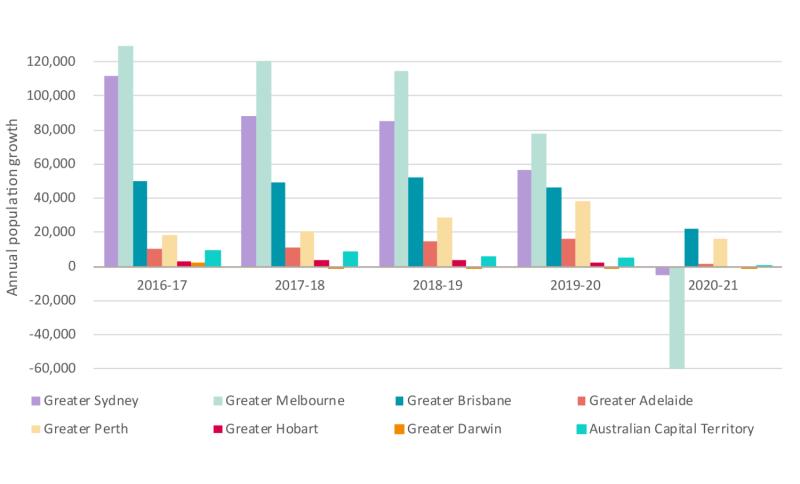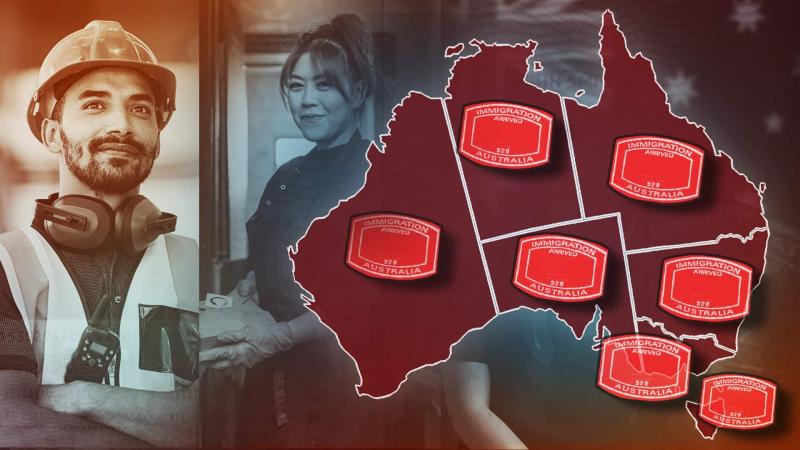Why Does Australia Need More Skilled Workers And Migrants?
Over the past century, the main driver of Australia's economic growth has been permanent migration. Over the past 70 years, Australia has welcomed more than seven million permanent migrants, more than two million of whom have entered in the last ten years.
These immigrants tend to be younger than the Australian population, more likely to have postsecondary degrees, and facilitate crucial international business and financial ties. Recent waves of immigration have not negatively impacted Australian-born workers' income or employment opportunities, as CEDA showed in its Effects of Temporary Migration report.
The permanent immigration program has changed over time in response to societal expectations, political climates, and economic demands. However, it has continued to place a strong emphasis on choosing immigrants who will complement the domestic labour force.
But these long-term trends have been reversed by COVID-19, as the health response limits migrants to Australia from abroad. As a result, Australia is currently experiencing net negative migration for the first time since World War II. This will have a significant negative impact on economic growth and make the long-term negative effects of an ageing population worse. While pockets of skill shortage exist in some crucial areas, governments and the community will be concentrating on high unemployment rates and assisting domestic workers in changing careers.
How Covid-19 Impacted the Immigration in Australia?

Workforce skills have been cited by Prime Minister Scott Morrison as the "single biggest problem facing the Australian economy" as it attempts to recover from the COVID-19 pandemic. It's a top issue, according to employer surveys.
A further worry is the anticipated 85% decline in net international migration from 2018–19 levels in 2020–21 as a result of border closures connected to COVID. The urgency of increased and more flexible temporary and permanent migration has been emphasised by the Committee for Economic Development of Australia (CEDA), as the post-pandemic recovery increases the competition for talent and skills on a worldwide scale. Australia runs the danger of losing talented people to more alluring locations.
The decrease in foreign arrivals into Australia is not unexpected, but the increase in outbound migration was not predicted in the most recent data from the Australian Bureau of Statistics.
Businesses are concerned about the loss of migrants from Australia because of the severe skill shortages that Australia and the rest of the industrialised world are experiencing.
According to information made public on December 17 2022, Australia lost 88,800 persons in 2020–21 as a result of COVID's effects on international migration.
Delay In Visa Processing
A million potential employees are currently stranded in Australia due to an explosion in visa processing timeframes, which has made the severe personnel shortages that are crippling businesses and dampening economic sentiment worse.
Business owners in corporate Australia are finding it difficult to fill positions and maintain their operations as a result of two years of strict border controls and a flight of foreign students and vacation workers.
But according to immigration data viewed by Reuters, there were over 914,000 applications pending for temporary and permanent visa to Australia as of August 12. This has made it difficult to implement an apparently straightforward solution to the issue of allowing more migrants to enter the country.
About 370,000 of these are temporary visas in the vital categories of visitors, students, and skilled workers that are essential for the nation's economic recovery. Additionally, it includes people who are currently in Australia and want to switch to a more permanent visa status.
The lack of resources at immigration offices and the massive backlog of applications that went neglected for two years while the pandemic compelled the government to lock the borders are the main causes of the delays.
In order to reduce the enormous backlog, the department has hired more than 180 extra employees in jobs related to Australian skilled work visa processing since May. It has been able to process approximately 1.14 million applications from persons outside of Australia in the past two months.
But given that more than 600,000 people on temporary visas have left the country since the pandemic, much more has to be done to close the significant skills gaps in the construction, hotel, and health sectors.
In order to reduce the enormous backlog, the department has hired more than 180 extra employees in jobs related to visa processing since May. It has been able to process approximately 1.14 million applications from persons outside of Australia in the past two months.
But given that more than 600,000 people on temporary visas have left the country since the pandemic, much more has to be done to close the significant skills gaps in the construction, hotel, and health sectors.
Why migration is crucial for Economic Growth?
Australia normally depends on immigration for approximately two thirds of its population growth, and skilled immigrants are a significant supply of talent.
The difficulties faced by industry sectors that depend on temporary and permanent migrants to fill skills gaps were made worse by COVID-related restrictions of national and state borders. Many people have struggled to find employment or will struggle once the economy recovers, such as those who pick fruit (e.g. hospitality, digital and data opportunities).
A report just released by CEDA calls for more permanent skilled migration. In order to demonstrate that recent migration waves have not resulted in lower earnings or fewer job opportunities for Australian-born employees, this report and a 2019 CEDA report are available.
The most recent report from CEDA asks the federal government to:
- Build up an online job matching service that is governed by the government
- Update the Standard Classification of Occupations Codes in Australia and New Zealand to allow immigrants with necessary or cutting-edge capabilities
- Be more open about how it determines which jobs should be considered for inclusion on the skilled occupation listings.
The Global Talent Scheme (GTS) is characterised as "extremely restricted" by CEDA. Following COVID, Minister Hawke recognised, Australia's immigration policies must be more adaptable and responsive. He cited the higher GTS intake of 15,000 slots in 2020–21, which is a triple of the allocation from the previous year.
The migration program's structure and composition, however, are still unknown.
How the Australian Government intends to address these issues?
We have watched as the COVID-19 border controls and quarantine standards have been relaxed to create the "Trans-Tasman Bubble," a safe travel zone between Australia and New Zealand. The Department of Home Affairs has included numerous more exceptions and benefits for both onshore and offshore migrants. These exemptions and accommodations are meant to reduce COVID-19-related inconveniences and encourage family members of Australian citizens, permanent residents, business investors, and skilled immigrants employed in "important industries" to travel.
The Department of Home Affairs has also made accommodations that provide visa applicants more time to finish the requirements for their ongoing visa applications. Most recently, a relaxation of the requirement that some applicants be offshore at the time their visa is granted was made available. If a migrant does not fall under one of the listed exemption categories but still has to go to Australia right away, they can currently request for travel exemptions based on "compelling and compassionate" conditions.
Final Words..
With all of these, we now know that Australia may be your land of opportunity if you're trying to start or advance your career. The government has now softened its attitude toward immigration. Immigration law is still very complicated, and its rules and regulations can change frequently. Therefore, in order to receive relevant and up-to-date guidance for your visa applications, speak with experts.
Regardless of the visa option you chose, whether you are moving permanently, joining your family, or travelling to Australia for employment, an Australian migration lawyers can help to make sure you have the best chance of success.
More to Read:
Previous Posts:










